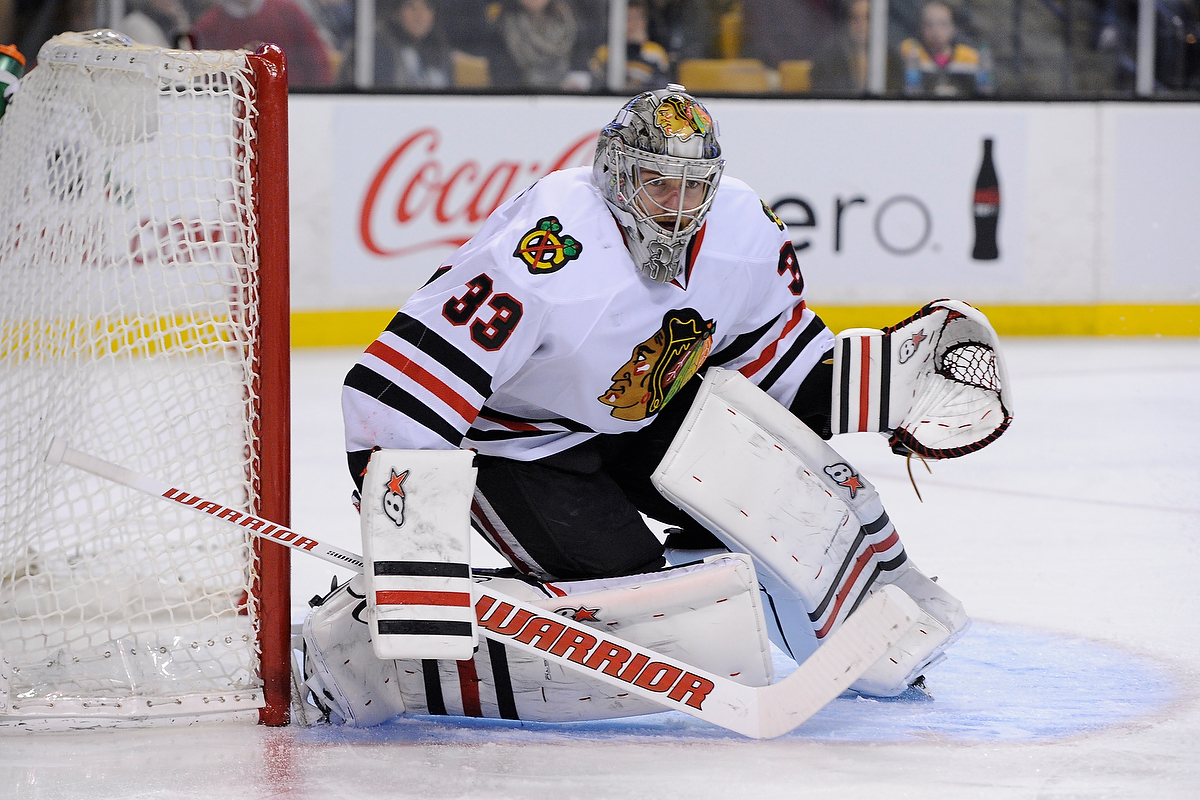 |
| Photo courtesy of Inside Hockey |
It's game one of the playoffs.
The Chicago Blackhawks are in Nashville for what many expect to be a very closely contested series.
One period in, the score is 3-0 Nashville. Hawks goalie Corey Crawford was very shaky in the first, allowing 3 goals on 12 shots. The game is slipping away.
At some point during the intermission, Blackhawks coach Joel Quenenville looks at backup goalie Scott Darling and says, "you're in." I was surprised by the short leash, but clearly
I'm not sure whether to call him a star, a cult hero, or an internet darling (I swear, no pun intended), but this goalie from Lemont, IL became more than just a backup. He stopped all 42 shots he faced, and the Blackhawks came back to win the game in double overtime.
This wasn't your average 42 save playoff performance over 3+ periods, Darling made some absolutely spectacular saves, with this one probably being the best:
Great game from Darling, but it just made sense for the Blackhawks to return to Corey Crawford in Game 2. Darling's career was only 13 starts deep, and despite playing well in those starts, the sample size wasn't large enough to justify pulling the starting goalie after one bad period.
Quenneville did just that, and the Preds proceeded to put up a 6 spot on Crawford in Game 2. Now the decision was easy. Crawford wasn't up for it, it was Darling's time.
Boy, did he answer.
In his first start, he stopped 35 of 37 shots, as the Blackhawks took a 2-1 lead in the series. Two nights later, Darling reached his zenith. He made 50 saves on 52 shots in a triple overtime thriller in Chicago, as his team moved one win away from advancing to the next round.
These numbers aren't really doing him justice. Saving 85 of 89 shots over 8+ periods of hockey in two nights is outstanding enough, but the way he reached those numbers was even better. A lot of the saves he was making would have been impressive even for the Prices, Lundqvists, and Rinnes of the world. He had people questioning if he was even of this species. In fact, Darling was even outplaying the opposing goalie, the aforementioned Pekka Rinne, during his time in Games 1, 3, and 4, which all ended in wins for his team.
The good play continued for the first two periods of Game 5, a only Filip Forsberg was able to get past Darling with about five minutes left to go in the first. The score was 1-1 after two periods. Three minutes and fourteen seconds into the final period, the Preds were leading 4-1 after scoring twice in the last twelve seconds.
Now, the goalie position was in question once again. The alien that possessed the body of Scott Darling had disappeared at the end of Game 5, and it wasn't clear whether or not it would ever return.
All eyes were on the backup goaltender to begin Game 6, and 11:16 and 3 Predator goals in, Quenneville (presumably) sighed and called on Corey Crawford again. Crawford shut out Nashville for the rest of the game and the Blackhawks went on the win and advance.
What happened to Darling was simple: regression. He's a backup who got hot, and he the hot streak ended.
But now what does Quenneville do for the rest of the playoffs? Does he just have a short leash on Crawford and be ready to stick Darling back into the fray and hope he succeeds again, or trust that his sometimes inconsistent starting goalie will be able to turn it around himself when things go badly. Personally, I'd stick with Crawford, but it's a very tough call. Darling was incredible for a while, and earned three of the four wins so far this postseason. At the same time, he's a rookie backup. But, he's also the same man who caused my friend (who's a Predators fan because when choosing a team to root for he asked himself why anyone would put a team in Nashville, and decided to go with them) to make this proclamation:
My friend Phil, a disgruntled Preds fan, just told me that he's never letting his significant other call him Darling
— William Botchway (@WilliamBotchway) April 22, 2015
We may see Darling again between now and June, or we may not. Either way, it was a damn good run while it lasted. 
